BY KERYN MATH ’24
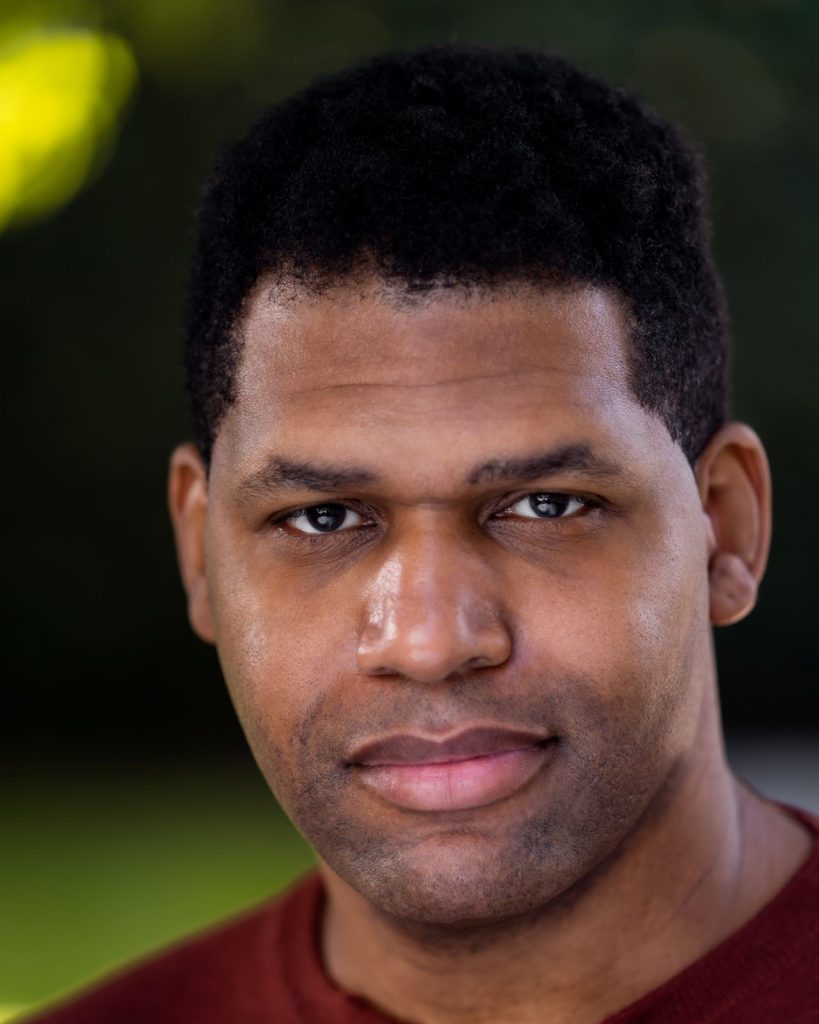
On Saturday, February 17th and Sunday, February 18th, writer, comedian, and actor Patrick Rowland came to Skidmore College to teach a workshop on improv comedy. Click here to go to his website.
The following is an interview between Patrick and staff writer Keryn Math ’24.
Keryn: You’re a busy man, Patrick. So if there’s anywhere you need to be, let me know whenever you gotta go!
Patrick Rowland: You know, I’m just gonna get up and walk away right now.
(Patrick stands up, about to leave.)
Keryn: Oh, okay; no problem!
(Patrick sits back down and laughs.)
Keryn: Oh, that was a joke! I’m terrible at sarcasm.
Patrick Rowland: (laughs) Don’t worry about it.
Keryn: Anyway Patrick, I was counting down the days until I got to interview you. I mean, I don’t know if you remember me, but I was in your improv class two years ago. And guess what? You literally, like, changed my whole path in life.
Patrick Rowland: Whaaaat?
Keryn: Yes! I always loved comedic acting, but my perception of the comedy scene at the time (like improv, sketch, and standup) was that it was too gritty for someone like me… I mean, you’re wearing all black, and I’m wearing a neon orange Frosted Flakes sweatshirt. But taking your class changed my entire perception of the comedy scene. You taught me that the most special thing about a comedian is his/her/their unique perspective on life. What’s that thing you always said? “There’s only one you,” something like that?
Patrick Rowland: “Don’t try to be the next someone. Be the first you.” What makes you stand out is your
own voice.
Keryn: Are you like talking to me, or just in general?
Patrick Rowland: (laughs) Just in general.
Keryn: Oh, okay. Anyway Patrick, you studied at The Second City, and I was like, “If people like Patrick Rowland are at The Second City, I want to go there!” And so I did, and I loved it, and now I’m in the comedy scene…all thanks to you!
Patrick Rowland: That’s awesome!
Keryn: I know, right? So you’re basically a celebrity in my mind, but for the people who don’t know you, what’s your name, favorite color, and hobbies…like, who are you outside of the comedy you do?
Patrick Rowland: Okay, so. I’m Patrick Rowland. My favorite color is black–as you said before, it’s what
I’m wearing. And my favorite hobbies? Well, I love to bowl. I actually used to think I was going to be a professional bowler when I was younger. I had the ball, the shoes, the bag…everything. And then I got bored of it (laughs). I also love to read. But mostly my main hobby is watching just trash TV.
Keryn: (gasps) What kind of trash TV?
Patrick Rowland: 90 Day Fiance, Married at First Sight…
Keryn: Oh my god, did you just say Married at First Sight?
Patrick Rowland: I did, yes.
Keryn: I LOVE MARRIED AT FIRST SIGHT!!! Have you been watching The Denver Season?
Patrick Rowland: Yes!
Keryn: I looked up the spoilers…do you want them?
Patrick Rowland: No. I already know none of the couples are gonna make it, so…
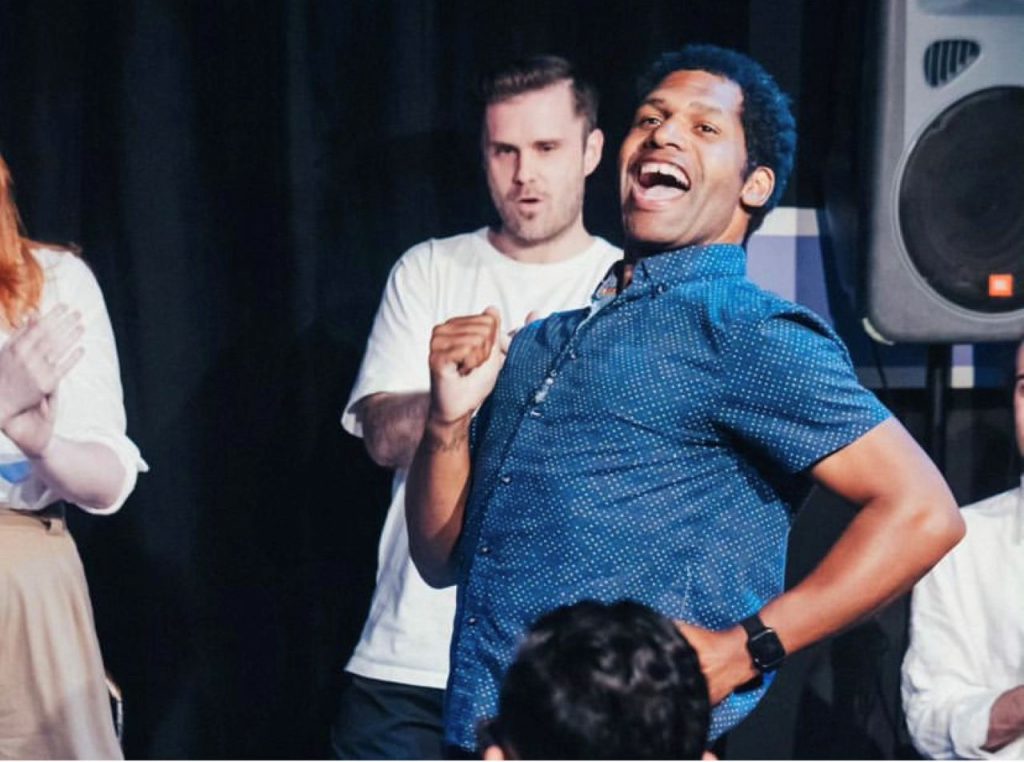
Keryn: Yeah, you could just tell. Anyway, I could talk to you about Married at First Sight all day, but like I said, you’re a busy man! So before you found out about The Second City, you worked at the post office. Was that a job you planned on doing for the rest of your life, or were you actively searching for another job?
Patrick Rowland: I wasn’t searching for another job, no. At first, I worked for Motorola, but then I got laid off. But, at that time the post office had this big hiring, so everybody was taking the test, even my brother. He didn’t get in, but I did, so I thought, “Okay. This is my career, I guess. This is where I’m going to be for the rest of my life.” We’re always told we’re supposed to get a good job, get married, have kids, move to the suburbs, all of that. So I was like, “Good job, check.” Now all I got to do is get married, have kids, and move to the suburbs. But when I thought about it, deep down, I didn’t want to do that.
Keryn: When was this, Patrick?
Patrick Rowland: I remember I started working there in 1999.
Keryn: Okay, so before I was born.
Patrick Rowland: Oh no, don’t do that to me.
Keryn: (laughs) Don’t worry; it’s only like three years before, so you’re good. Did you have any kind of retirement plan?
Patrick Rowland: Yeah, I was actually set to retire in 2033. And I still have friends who are celebrating their 25th anniversary working there. But I was just like, I couldn’t have made it to that point, because I just couldn’t do it. There’s nothing wrong with working there at all, but it wasn’t for me.
Keryn: Yeah. It was probably cognitive dissonance for you, working there. I think it’s harder to stay away from your dreams than it is to actually follow them. Like the drive might go away, but the dream never does. I mean, I’m not saying it’s gonna be easy, following your dreams, but neither is thinking to yourself in the years to come, “I wish I would’ve done that.” Has comedy always been your dream?
Patrick Rowland: Yeah, I always wanted to do something in comedy, but I didn’t know what. I was growing up in the black community, and there, the only comedy I experienced was stand-up. Like Eddie Murphy’s raw, Richard Pryor… my mother had A-track tapes that had all these comedians on them, and I would listen to those, which made me laugh a lot. And I watched how my family and my friends would laugh at things and how happy it made them. I was like, I want to do that. I want to make people laugh. I just didn’t know how. And so I wanted to try stand up, but I was just like, “I don’t know how to write jokes. I don’t know how to do stand-up. Above all that, I’m too shy to get on the stage by myself and just tell jokes.” So it just kind of petered out. When we would write short stories for English class, I would always write something funny, but I just thought, “Well, this is all it’ll be to it.” I never thought I’d be doing it for a career. I just thought like, “I’ll just be like that funny, weird guy all around.”
Keryn: Like the funny guy in the post office?
Patrick Rowland: Yeah. And when I saw this show at the Chicago Improv Festival, I didn’t even know what improv was. Never heard of it, never knew shows like, “Whose Line Is It, Anyway?” Back then, I knew that comedy consisted of stand-up, Saturday Night Live, and Mad TV, and that’s about it. And I was like, “I don’t know how to crack into that.” So when I saw the show, it just sparked something that I pushed down and kept dormant for so long. I went on my computer and searched, “Improv near me.” And when I did that, that’s when The Second City popped up. It was like, “Oh, there are places that teach this! Okay, so that’s somewhere to go with it.” But I just thought it was a fun hobby and that I’d still have my career at the post office and do that on the side. And later, the post office job became my side thing, and improv became my main thing!
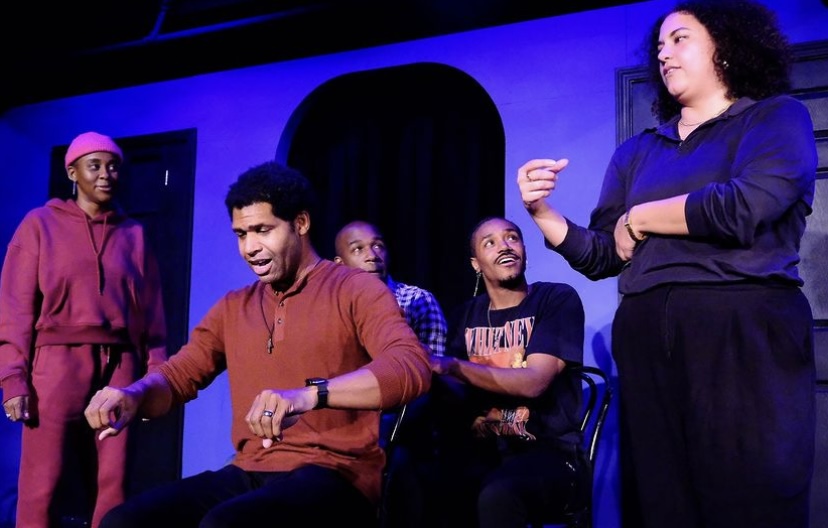
Keryn: How did improv start to become your main thing?
Patrick Rowland: So it started off with me taking a couple of writing classes. Then I started taking improv classes while I was taking the writing classes. Then I found out about the iO Theater, another comedy theater in Chicago. So now I’m taking two improv classes while I’m doing my writing classes. Then somebody was doing a workshop, and then I’d watch them in a show… and one day when I got up for work, I thought, “You know, I have a lot of sick days I haven’t used yet. I’m going to call in sick and do more improv!”
Keryn: When was this, Patrick? Just so I have a time frame.
Patrick Rowland: I started improv in 2006.
Keryn: Okay. So I’m four years old by this point if anyone cares. Continue!
Patrick Rowland: (Laughs) By 2009, I’ve gone through most of the programs and I got placed on a Herald team at iO. And once again, my thought process wasn’t, “I’m going to do this, then I’m going to get on the Second City Main Stage, then the Second City Main Stage is gonna take me to SNL, which will take me to the big screen…” I never had that mindset until 2010, when I watched a showcase with comedians Paul Britton and Vanessa Bayer. During that showcase, in walks Lorne Michaels, (the creator of SNL), and I’m starstruck, like, “That’s the guy!” Not long after that showcase, Vanessa Bayer and Paul Britton both got hired to work on SNL and I was just like, “Well, now I know how this process works.” And from that moment on, it just seemed like a more achievable goal. I stopped making comedy a hobby and started making it a priority.
Keryn: Yeah! Bowling and trash TV are your hobbies…not comedy!
Patrick Rowland: Right? Interestingly enough, the post office was going on a big firing spree to save
money…I knew I was next, so I just quit. They offered me a buyout of $15,000, so I took that and went forth into my comedy career.
Keryn: I know I’m gonna sound crazy, but it almost sounds like destiny!
Patrick Rowland: It does. I started really working on characters for like a year straight. I kept auditioning
for The Second City, and for some reason, they didn’t want me. But those rejections actually inspired me to write my first solo show called, “Why Don’t You Like Me?”
Keryn: Rejection is redirection! But oh my gosh, can you talk more about that show? I wish I was alive to see it.
Patrick Rowland: (Laughs) It was basically a bunch of characters based on controversial figures in the media. One of them was Barack Obama. He just got elected for the first hundred days or so, and people kept criticizing him, even though he hadn’t done anything. So I was like, “Give the man a chance!”
Keryn: And now you do that Barack Obama character on The Amber Ruffin Show! For those of you who don’t know who Amber Ruffin is, you should–she’s the first African American woman to write for a late-night talk show in the United States. Patrick, what was your path like, from the “Why Don’t You Like Me?” solo show, to writing for one of the most popular late-night talk shows in history?
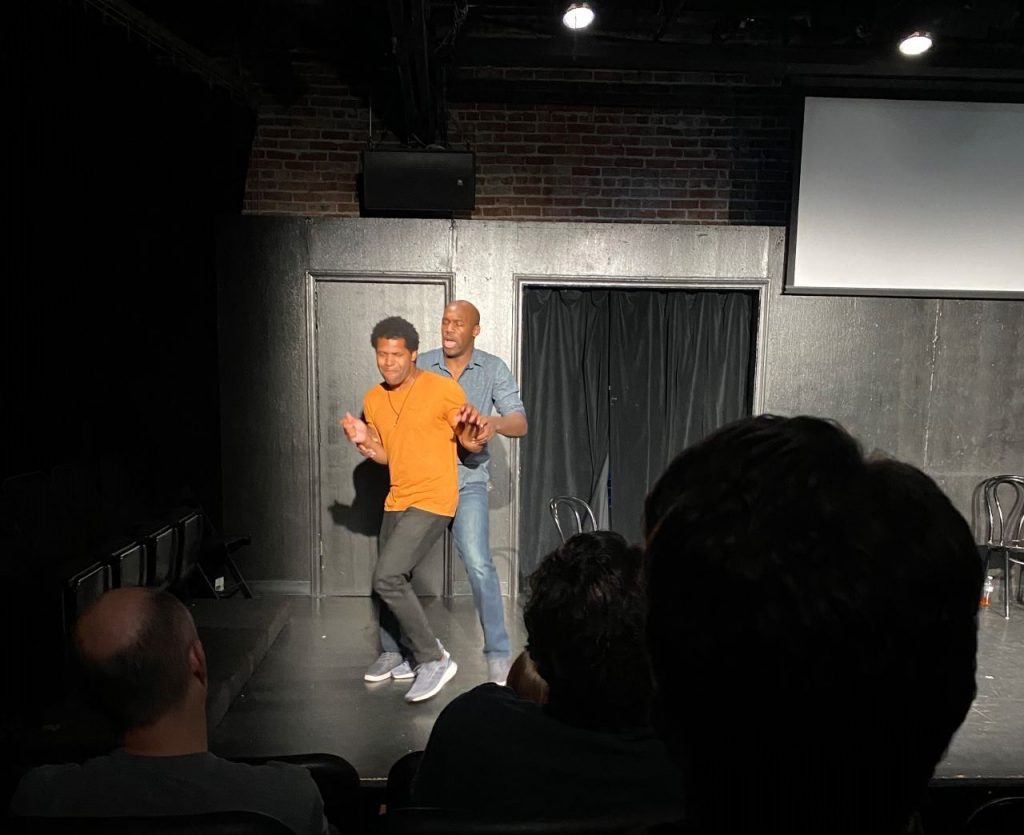
Patrick Rowland: When I was in the writing program at Second City, Amber was performing on the Main
Stage. I watched the show, and I remember seeing her and thinking, oh, “Somebody that looks like me is up there.” I knew that the Main Stage cast would sometimes go to the Old Town Ale House afterward, so I waited there, and when they showed up, I ran up to her and was just like, “Hey, just wanted to say I’m a student here. You’re amazing. You don’t know how much it means to get to see black people doing this. Anyway, sorry to bother you; I’ll leave you alone.” But she didn’t let me go. She sat there and talked to me for like an hour. And she remembered me and thought of me when she got her own show. She’s always been such a supportive person throughout my career.
Keryn: That’s incredible. I think your story says a lot about how important representation is in the media, and also like, “Don’t be afraid to put yourself out there.” I mean, I saw Spike Lee on an airplane once, and I was actually sitting in the row behind him. But my 50-pound cello made contact with him before I could!
Patrick Rowland: (laughs) Oh no.
Keryn: Yeah, so sometimes approaching someone famous doesn’t work out. But other times, it does! Like you and Amber Ruffin.
Patrick Rowland: Yes! It’s really about taking that initiative.
Keryn: You mentioned how Amber Ruffin has been an inspiration in your career. Who are some other people who helped you become the successful comedian you are today?
Patrick Rowland: Rachel Mason, for sure…she’s the one that referred me to this program here at Skidmore. Rachel was one of my first improv instructors at iO. She really helped me find my voice and embrace who I am. Susan Messing is another great inspiration for me. Christina Anthony. Charna Halpern (who helped create iO) helped me get an agent and put me up in the SNL showcases, which led to me flying out to audition for the show. Come to think of it, my inspirations are mostly women.
(Keryn snaps her fingers.)
Keryn: I would ask about the SNL audition, but I don’t want to breach any NDAs you might have signed. So let’s move on to the next question: many writers just like wait for inspiration to strike. But when you write for a living, especially with such a quick turnaround time, you don’t always have that luxury. How do you go about writing on a deadline?
Patrick Rowland: I’ve taught myself to be inspired by everything around me, even when I’m not writing. So when I do get inspired, I write it down on my phone.
Keryn: I can relate! As a writer, the notes app is your #1 best friend.
Patrick Rowland: It really is. I have like 1000 notes in here right now, and it’s all sketch ideas.
Keryn: Here’s a question I just thought of: what would you do if your phone fell in the bathtub?
Patrick Rowland: (laughs) I think I’d just be like numb. Time to move on to heaven.
Keryn: (laughs) Where do you usually find inspiration from?
Patrick Rowland: Sometimes I just surf the Internet looking at different news stories. Or sometimes I’ll just start writing about anything, just brainstorming something. I could make a list of character types, like, oh, vampires, robots, pirates, and then circle one I like the most, and then I just brainstorm everything about them. And then usually an idea emerges from that.
Keryn: That’s awesome. I mean, your background in improv probably helps you, too.
Patrick Rowland: Some of my best sketches come from improv, definitely. Even when I have ideas for the show, I write a detailed beat sheet pitch for a sketch and present it, and then they always hit me with, “What else do you got?” So I come up with something off the top of my head. When it comes to improv, I’m less in my head and more in discovery mode. Norm Holly was my teacher at The Second City–
Keryn: He was also mine! Hi, Norm! We love you!
Patrick Rowland: (laughs) And for our student showcase, we saw the other students come in from conservatories with scripts, but we had no scripts. We would improvise our scenes, re-improvise them, then keep re-improvising them. Nothing was typed out or memorized…it was one of the best shows of the night.
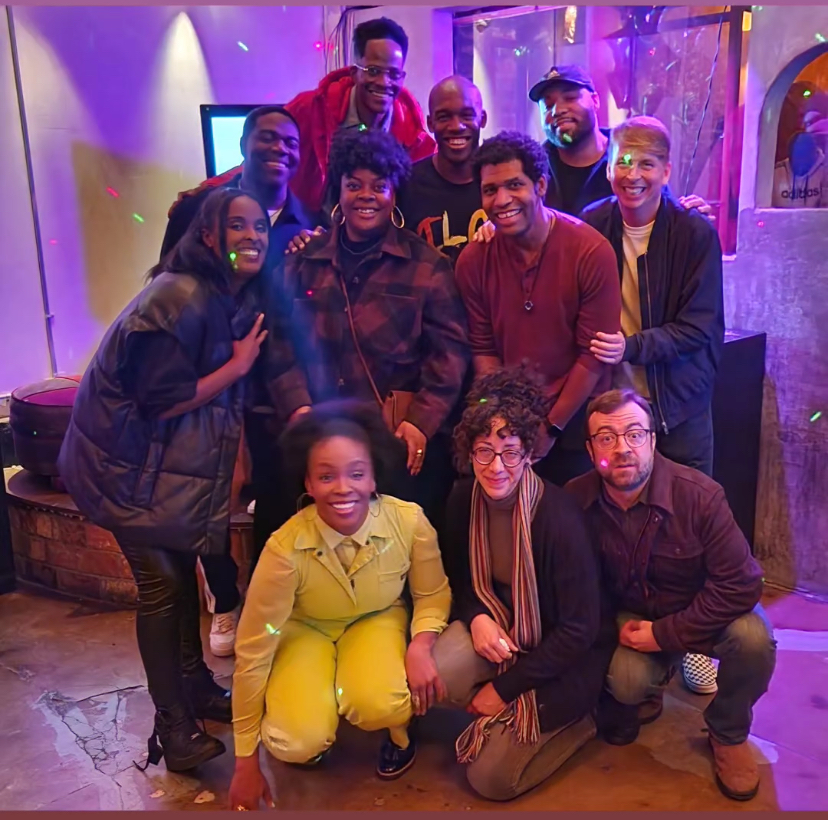
Keryn: Amazing.
Patrick Rowland: So yeah, I really lean heavily into my improv background when I write sketches. Great
question!
Keryn: Great answer! Okay Patrick, I hate to dampen the mood here with this question, but I think it’s important to ask: what was the writer’s strike like for you?
Patrick Rowland: It was rough; it really was. You go from creating things constantly and having this really great job to doing virtually nothing. It almost felt like a second pandemic to me, and I’m still trying to get out of that. Cause, it was like, “Alright, well, the writing’s gone. I’ll start auditioning for acting roles.” And then the actors went on strike! And I’m both SAG (Screen Actors Guild) and WGA (Writers Guild of America). So I’m not gonna lie, it broke me. And I’m just now picking up the pieces and getting myself back out there. And that’s why I’ve started writing a bunch of sketches that I’m going to start filming, and I’m going to release them weekly.
Keryn: Yeah, I always think that like when in doubt, or in times of drought…keep writing.
Patrick Rowland: Yeah. My wife calls it business hours where we’re like, “Alright, from this time to this time, you’re just going to write. Whatever you write about, just write.” And suddenly five hours will pass by. So I try to set a goal for whenever I can to write something, whether it’s working on a pilot, working on a future film that I’m writing, or a sketch idea. Even just writing the curriculum to teach writing. It can be any length, as long as I just write something.
Keryn: You gotta keep those creative juices flowing! Okay, Patrick, hang in there; we’re almost done. What are your current goals for yourself right now?
Patrick Rowland: Well, now that the strike is over, I’m setting up meetings with people in the industry. I
also have a show called The Patrick Rowland Sketch Show–
Keryn: I’m assuming you’re in that, right?
Patrick Rowland: (laughs) Correct! So I’m trying to get that show back up. I just finished editing my intro video for it. I’m just going to keep writing sketches, filming them, and putting them out on the Internet.
Keryn: Perfect! That actually leads me to my last question, Patrick: where can people find you? On social media, I mean… not your address.
Patrick Rowland: (laughs) Yeah, I wouldn’t want to give that out. My Instagram and TikTok handles are
both @prowland76 . And my Twitter, X, whatever it’s called…that’s @patrickrowland3 .
Keryn: Boom! Just followed you on all platforms.
Patrick Rowland: Wow, that was fast.
Keryn: Follow me back, okay?
Patrick Rowland: Will do.
Keryn: Thank you so much for your knowledge and time, Patrick.
Patrick Rowland: Of course!
Keryn: You are now free to go back into the world!
Patrick Rowland: Alright.
Keryn: Now let’s hope I pressed the record button…
Photos by Patrick Rowland
***
Keryn Math ’24 is a staff writer for the Skidmore Theater Living Newsletter
